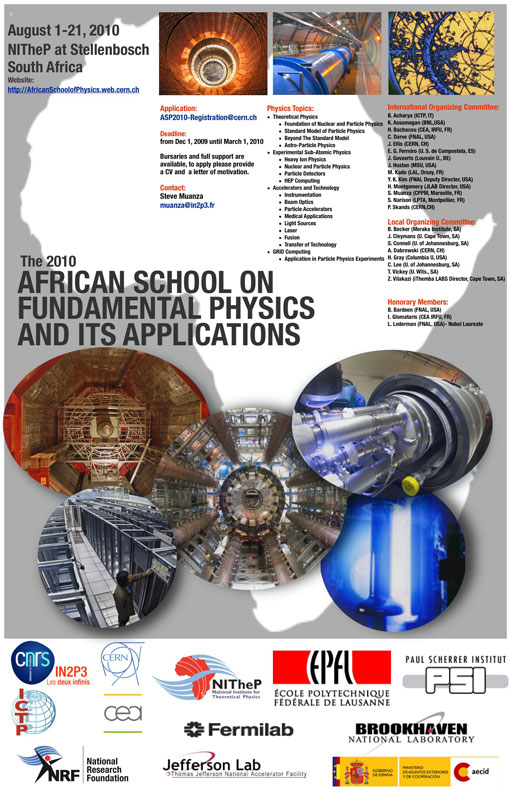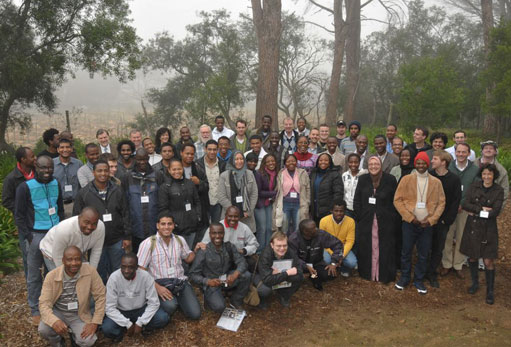
ATLAS e-News
23 February 2011
ATLAS Helps Plant Learning Tree in South Africa
7 September 2010

The new African biennial summer school was brought to life with diverse efforts, many from ATLAS colleagues.
ATLAS colleagues have played a large role in the formation and administration of the first Biennial African School on Fundamental Physics and its Applications which was held August 1-21 in South Africa. In addition, many current and former ATLAS members such as Ketevi Assamagan, Simon Connell, Andrea Dotti, Daniel Froidevaux, Heather Gray, Peter Jenni and Steve Muanza gave lectures at the school.
The purpose of the school was to increase the capacity in Africa for fundamental physics and its applications, as well as to establish a path to the benefits associated with such development. The pedagogical approach of the school was central to its success because it took into account both the general and specialized education needs of the students.
Building on the strong scientific foundation in South Africa, the school reached out to students and scientists from neighboring sub-Saharan countries and beyond as well. It was the general opinion of the school organising committee that this approach would best contribute to the development of fundamental physics knowledge in Africa.
The 65 participants were selected out of over 200 applicants, and were primarily doctoral students, master's students and young researchers coming from 17 African and four other countries. Heather Gray, of the local organising committee said that, “Because people in Africa don't really have so much money, the idea with this school is to fund every single student. This is wonderful because it just meant that [all they had to do was] apply and be accepted, and they didn't have to worry about [financial] stuff.”

Smiling participants of the first Biennal African HEP School
Last Feremenga from the University of Chicago, whose home country is Zimbabwe puts it that way: “The school as a whole was humbling and yet motivating. The complexities of the basic principles in theoretical physics made me
realize how big a hole I have in physics; at the same time, the wit and expertise with which everything was presented strengthened my motivation to get involved in further pursuing research in physics, especially high energy.”
“[This school] has been a wonderful and unique experience,” said Michael Kagan an ATLAS graduate student from Harvard, and one of the handful of international participants. “Being able to meet students from all over the African continent and to connect with them through our mutual passion for physics has been an engrossing experience. During this program, I have learned a great deal not only about particle physics but also about the role of physics in many different African nations. More generally, this experience has opened my eyes to prospects of using physics as a means of education, communication, and development."
The first week of the school's three-week duration was dedicated to the review of the theory underlying some of the central HEP concepts. This was done to ensure that each student could review this theoretical foundation that they may have only had slight exposure to before. Then, the main topics covered were experimental subatomic physics, detector techniques, accelerators and technologies, and information technology with an emphasis on GRID technology. Each topic was subdivided into an initial set of recaps of essential background knowledge, followed by four main lecture themes, and finally a dedicated theme on computing-related aspects of the topic, including Monte Carlo generators, GRID, and high-performance computing. Aside from the core curriculum, three special ‘star’ lectures highlighted the cutting-edge aspects of current research presented at the school.
Heather also commented on the curriculum saying, “I think the amount of application involved with this school is quite unusual. It's something different that they chose to do, which makes sense because in Africa there isn't so much money to build enormous accelerators and just do high energy [physics], and so they're doing both things. They're seeing if people are interested in [accelerators], but also giving people ideas of something they can [more easily implement] in Africa as well. The other thing about the school is that there is quite a focus on computing. There are computer labs every week, and they're teaching skills that can be used.”
The idea for the school was initially posited 10 years ago by John Ellis, but it was Steve Muanza, an ATLAS physicist at France's CNRS/IN2P3 and the co-founder and director of the school, who gathered the group of people that finally passed the 'critical mass' to start and run the project. Steve's parents are from the Democratic Republic of Congo and, although he was brought up as a French citizen, he is strongly influenced by African culture and has always had the vision for such a school. He had tried various avenues for support and found many people at CERN, Brookhaven, Fermilab, and other institutions who were interested in an African school too. As Anne Dabrowski, another member of the school's local organising committee and working at CERN on the CLIC project, put it, “In the end we all just joined forces towards one common goal.”
The African school is a project which the supporting group of individuals and institutions hope will have an impact. Anne noted that, “CERN has, in recent years, provided scholarships for a few African students to come to CERN as summer students. In addition, through the teachers program, CERN has also supported a few high school teachers from Africa, with the philosophy that exposing one good teacher to the program will then mean that through them, many more students are better informed about fundamental research and the research engaged in at CERN. So, the main thing with this [school] is that we're doing the same thing, but on African soil.” Both Anne and Heather also agreed that in place of the aforementioned attempts to send seeds to plant for student learning, this school was akin to planting a full grown tree on African soil, ready to give fruit to the students and apt to grow on its own.
ATLAS has been involved in the formation of the school, with collaboration members participating actively in administrative panels and lecturing at the school. Christine Darve, Steve Muanza and Ketevi Assamagan played important roles in the overall organisation. This school is something to look forward to watching evolve and blossom in the future.
 Sarah McGovernATLAS e-News
|